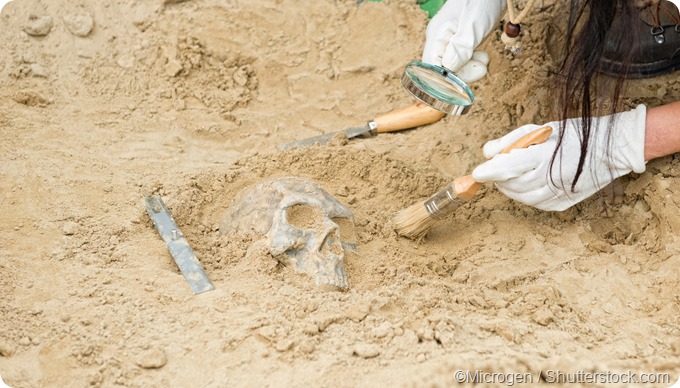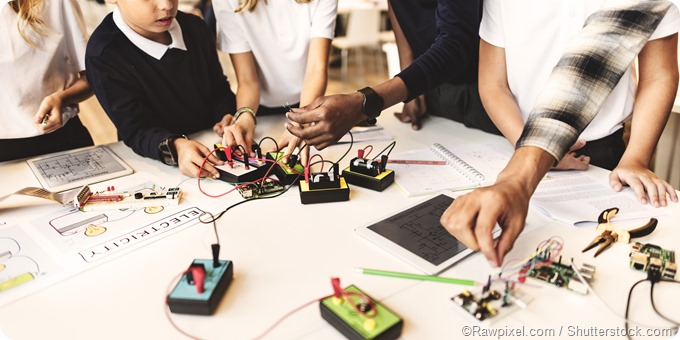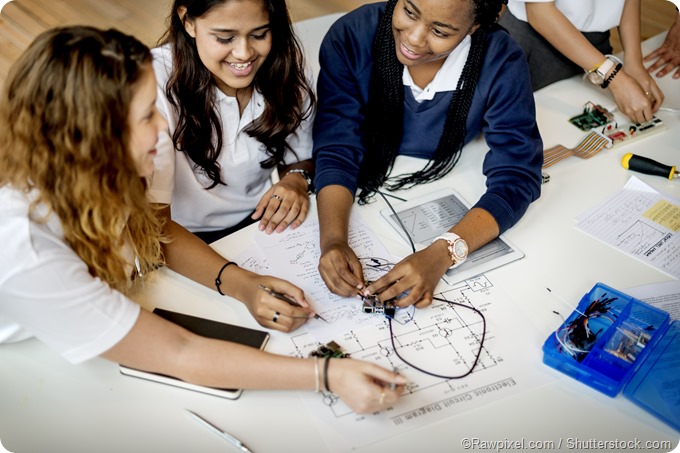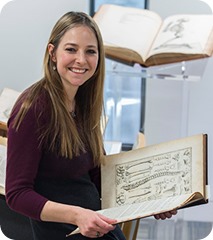I was interested in a whole range of subjects, but the one that really grasped me from a young age was biology and, in particular, human biology. I was really fascinated with how the human body worked and I still am; that's something that has stayed with me.
I had a fantastic pop-up book by Jonathan Miller and David Pelham, which was given to me when I was about eight or nine. I've still got that book on my bookshelf and it still excites me when I open it today!
What have been the best moments in your career to date?
That's really tricky because I've had such a varied career. I had a career briefly in medicine. I studied medicine at university and I qualified as a doctor.
I really enjoyed the practice of medicine and particularly surgery, but then I ended up becoming an academic - because I followed my passion for anatomy. I had a strange fascination for old bones, which became the focus of my research. Finishing my PhD felt like a big achievement. It’s a real rite of passage!
Working in television, I’ve had some amazing opportunities and experiences over the years. Coast was great fun to make, and I loved making “The Incredible Human Journey” for BBC2, about the ancient colonization of the world. I’ve been lucky to spend time with a number of indigenous communities, including reindeer herders in Siberia and Hadza hunter-gatherers in Tanzania. More recently, making “Digging for Britain” is a great privilege, as I get to meet archaeologists working on exciting sites all over the UK.

What challenges have you had to overcome in order to pursue your ambitions?
I felt quite acutely at various points in my career that being a woman was not necessarily an advantage. I found that quite peculiar because when I was growing up, I went to an all-girls school and there was never any question that women shouldn't be equal in our society. There was no suggestion that some subjects were out of bounds or off limits just because of my gender. I studied Physics A level - why shouldn’t girls study Physics?
Once I got into the world of work, I started experiencing the fact that our society isn’t quite as equal as we like to think it is - and that was quite a tricky thing to have to deal with! I once got passed over for promotion because I didn’t have “gravitas” - I think that meant I couldn’t grow a beard!
I don't give up easily though. Yes, I'm a woman, why on earth shouldn't I be pursuing the career I’m pursuing? But I hope it’s going to get easier and that we do solve this problem with equality - because it is still a problem. We’re kidding ourselves if we think we’ve solved it. And that’s a problem for society as a whole - it means we’re missing out on a huge amount of talent and potential.
How varied can careers in science be and what advice would you give someone considering science as a career?
I think the idea of a “scientist” can be very narrow. When you ask young children to draw a picture of a scientist, they can have a very stereotyped idea of what a scientist looks like - often a man in a white coat, with test tubes, in a lab.
Lots of scientists (though not enough!) are female, and not all them work in a lab. There are scientists who spend a lot of time outside, doing field work - such as geologists, ecologists, environmental scientists and so on. There’s a huge range of different sciences and subject areas, and scientists themselves are a hugely diverse bunch.
So I think trying to give children an idea of the huge diverse variety of careers in science is really important. Some surveys suggest that a perception of science as difficult can put people off studying it and aiming for a career as a scientist. Making sure that children get the opportunity to meet some real-life scientists might help them realize that it's not so daunting a prospect as they might think it is!
What misconceptions and myths about careers in science would you like to dispel?
The idea that science is a monolithic thing and that there's just one way of doing “science” and being a scientist, when actually there's a hugely diverse range of careers and a hugely diverse bunch of people doing it. I think that's the most important myth to dispel.
In some ways, I think it's just the language that ties us up in knots. We seem to talk about “science” as though it is one thing. We should really be talking about sciences rather than creating this monolithic image for ourselves. We talk about the arts, yet we don't tend to talk about the sciences.

Can you please give an overview of the GenerationeXt initiative?
The whole point of the GenerationeXt initiative is to enthuse and engage young people about the diversity of careers in science and give them the opportunity to meet some people that are pursuing science.
Children get fantastic advice from their career teachers in schools, but meeting real scientists may help to dispel some myths and provide a bit more detail of what those careers can actually mean.
The people I've met at Roche today all really enjoy their work. Drug discovery is a wonderfully creative and exciting field to be working in - and can have such a positive impact. I think sometimes we forget that most scientists genuinely want to make the world a better place.
How important is it to encourage young people to get involved in science and what more needs to be done to increase participation?
I'm concerned about some of the rhetoric about encouraging children to consider careers in science and technology. I don't think that a career in science is the only fulfilling career you could ever have or that it is right for everybody.
On the other hand, I don’t want young people to feel that particular career choices are shut off to them. And they shouldn’t feel that it’s such a dichotomy either - they don't have to decide whether they're going to be firmly allied to either the humanities or the sciences for the rest of their lives. People who end up pursuing careers in science can still engage with the rest of culture. And people who end up pursuing other careers can still be interested in and engaged by science.
It’s important that everyone has a certain level of scientific understanding by the time they leave school - a good foundation. Lots of the big decisions facing us as a society require a certain level of scientific literacy. So it’s incredibly important to bring out that relevance of science - to us individually, as a society, and to the planet as a whole.
Why is this an exciting time to be a scientist?
I think it's always an exciting time to be a scientist! It's about finding out new things about the world. I gave a talk to open the day today to a group of 150 students. I was talking about the history of biology and embryology - and the excitement of discovery - even of things we take we for granted today.
On the one hand, it’s about the opportunity to change the world to be better for humans and the planet as a whole. But just that raw excitement of finding out something new is also fantastic. I've heard people say that they're not doing sciences to A-level, to the age of 18, because they think it's not creative and that's perhaps the biggest myth that I'd like to dispel.
Do you think there is a problem with the genderization of science subjects?
One of the things that really worries me is the genderization of science subjects and the idea that some subjects are for girls and some subjects are for boys. We know that's nothing to do with ability. There’s no real reason why only 1 in 5 A level Physics students is female!
I think that's really dangerous because it restricts people’s options. People are turning away from subjects that they might really enjoy. They think a subject is closed off to them because it's not the subject you'd expect for their gender. That's really damaging and we need to get rid of that.

How do you think we can overcome these issues?
In all sorts of different ways. Schools are working really hard to tackle those perceptions.
In Britain, 50% of physics A-level classes in our state secondary schools have no girls in them. I think that makes it a very difficult for girls that are coming up through the school. I think having role models is really important, as well as trying to tackle those negative perceptions in schools head on.
Having role models is also important. We've got fantastic female physicists on the BBC. We have a couple of very prominent male physicists in the form of Brian Cox and Jim Al-Khalili, but we also have Maggie Aderin-Pocock and Helen Czerski, so I think broadcast media is helping to present a more balanced view of scientists.
Then, it's a question of letting children or young people know a bit more about the careers that they could be getting into and helping them to realize that there's no reason for women not to be accessing certain careers. Equally, there is no reason for men not to be getting into certain careers. It is perfectly acceptable and natural for a woman to be studying physics and it's perfectly acceptable and natural for a man to be studying psychology.
About Professor Alice Roberts
 Alice is an anatomist, anthropologist and Professor of Public Engagement in Science at the University of Birmingham. She is also a broadcaster and has presented several landmark BBC series including The Incredible Human Journey, Origins of Us, Ice Age Giants and The Celts. She has also presented several Horizon programs, and occasionally presents Costing The Earth on Radio 4.
Alice is an anatomist, anthropologist and Professor of Public Engagement in Science at the University of Birmingham. She is also a broadcaster and has presented several landmark BBC series including The Incredible Human Journey, Origins of Us, Ice Age Giants and The Celts. She has also presented several Horizon programs, and occasionally presents Costing The Earth on Radio 4.
She has written seven popular science and archaeology books. Her book about embryology and evolution, The Incredible Unlikeliness of Being, was shortlisted for the Wellcome Trust Book Prize in 2015.